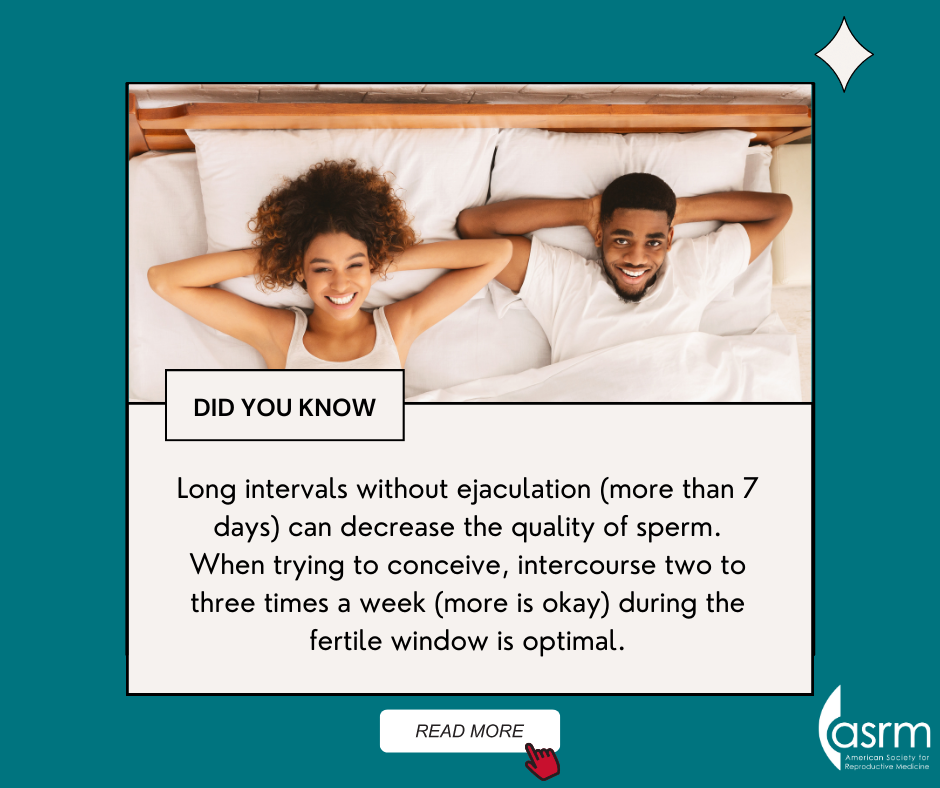
Revised 2023

What are our chances of getting pregnant?
The chance of a normal heterosexual couple getting pregnant is about 85% after one year. Of those couples that do not get pregnant in the first year, as many as half will get pregnant in the next year. Couples that have tried to have a baby without success for more than a year, or less if the female partner is 35 years old or older, may wish to see a fertility specialist. About 20% of infertile couples are found to have a male factor alone and another 30% have both male and female factors.
How is male fertility evaluated?
he first step in male fertility evaluation is a medical history and physical examination with a physician. A semen analysis should then be performed to collect information about the count and quality of sperm in the ejaculation. This test involves collecting a semen sample in a sterile container by masturbation.
How often should a couple have intercourse?
Couples should have intercourse, or sex, at least two to three times a week during the fertile period. A couple has more chances for pregnancy if they have intercourse every one to two days during the fertile window, defined as the six-day time frame that ends on the day that an egg is released (ovulation). Surprisingly, long periods of abstinence can decrease the quality of sperm so avoiding sex before the fertility window is not needed.
Are there coital (sex) practices that can improve our chances of getting pregnant?
Sperm ejaculated into the vagina reaches the fallopian tubes within minutes regardless of position during intercourse. Also, there is no evidence that orgasm or prolonged rest after intercourse increases the chance of getting pregnant. Some commercial sexual lubricants and other substances used for lubrication such as saliva or olive oil should be avoided during the fertile period. They may make the sperm move slower and decrease their ability to survive. You may want to discuss lubricant choices with your doctor since some are believed to be safe for use when trying to get pregnant.
Does diet affect fertility?
Obesity has been linked to impaired sperm production. Overweight men interested in optimizing fertility should attempt to attain an ideal body weight. There is little conclusive evidence that vitamins or supplements improve male fertility but a multivitamin with antioxidants may be recommended by your doctor given the low risk. Fruits and vegetables also provide a natural source of antioxidants and should be part of a balanced and healthy diet.
What are the effects of smoking and recreational drug use?
Smoking is associated with reduced sperm quality. Men who are trying to get pregnant should consider smoking cessation immediately. Recreational drugs, including anabolic steroids and testosterone, are associated with impaired sperm function and production and should not be used. There is mixed evidence about whether marijuana decreases male fertility but limited or no use is probably the safest option for optimizing chances of getting pregnant.
Are boxers or briefs better?
Some studies have suggested that tighter fitting underwear such as briefs may increase the scrotal temperature and cause a decrease in sperm quality. Other studies have found no link so underwear choice should still be based on what is most comfortable.
What else can affect my sperm?
Some medications, chronic medical conditions, and even high fevers can impair the body’s ability to make sperm. Ask your doctor how your medications or conditions affect your fertility potential.

How can I improve our chances of getting pregnant?
Like many aspects of health, a man’s fertility can be improved by adopting a healthy lifestyle. Maintaining an ideal weight, a diet rich in antioxidants, as well as multivitamins may improve the quality of sperm. Reducing stress and controlling chronic medical conditions such as high blood pressure and diabetes may also improve chances of getting pregnant. Remember that any lifestyle changes can take almost three months to show up as an improvement in the semen analysis. Couples with underlying medical or genetic conditions should see a doctor to optimize their overall health before getting pregnant.
Find a Health Professional

Fact Sheets/Booklets
View more fact sheets and booklets written by the ASRM Patient Education Committee.
Menopausal Transition (Perimenopause): What Is It?
The menopausal transition (perimenopause) is the period that links a woman’s reproductive (childbearing) years and menopause.
Osteoporosis
Osteoporosis and osteopenia are conditions of having low bone mass (density).










